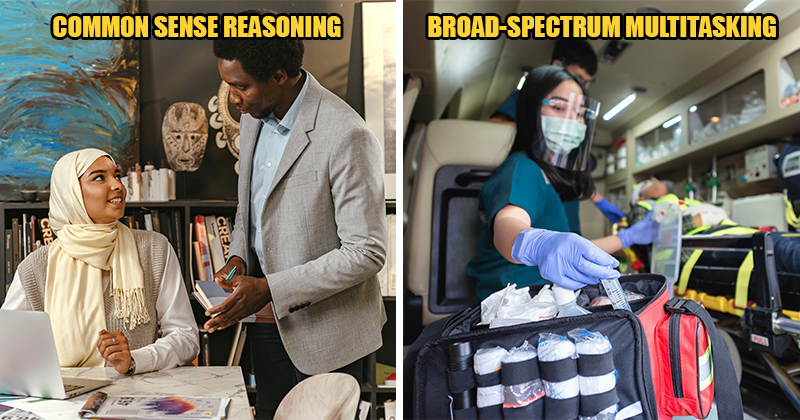Ever wondered if robots are taking over our jobs? ? This remains a heated topic throughout the rapid advancement of AI, but here’s the scoop: there are still tasks that AI struggles with as for now!
Even with all its smarts, AI hasn’t quite cracked the code on certain skills that humans excel at. This article dives into five areas where AI still falls short, showing why human intelligence remains essential in the workforce! ??
1. Broad-spectrum multitasking
AI excels at handling a wide range of well-defined tasks (e.g. analyse data, compose music), but it can’t switch seamlessly between these activities or manage them simultaneously.
? We humans, on the other hand, can juggle multiple tasks simultaneously and efficiently — think paramedics who assess patients’ conditions while operating medical equipment!
Plus, AI proficiency in highly specialised tasks may not match that of expert equipment or human professionals. For example, while AI can create music, it might lack the emotional depth and complexity of a human composer’s work.

2. Problem-solving in unstructured environments
Generative AI can produce human-like writing, making it ideal for handling and interpreting unstructured data from sources like emails, reports, and social media. However, it still may struggle with domain-specific issues that require deep knowledge and contextual awareness. Hence, it cannot process unforeseen changes or complex problems that require holistic understanding. ?
Unlike AI, humans can draw on intuition, experience, and creativity to navigate dynamic situations and make spontaneous decisions. An example would be search and rescue teams who implement response strategies in unforeseen disasters!

3. Creative thinking
AI is able to analyse large data sets, identify patterns, and combine concepts in ways that resemble creativity, which results in intelligent outputs such as poetry, music, and philosophical reflections. However, AI’s creativity and understanding are limited compared to human intellect. While AI can support and enhance human creativity by providing new ideas, it lacks the emotional depth, consciousness, and experiential background that drive true human creativity. ?
Humans can draw on personal experiences, emotions, and unique perspectives to craft art, music, or literature. Fellow artistes and poets, rest assured that your depth and originality remain unmatched!

4. Common sense reasoning
Generative AI can mimic understanding of context and meaning based on patterns in training data, often producing appropriate responses and can detect subtleties in language, such as sarcasm and tone. ?
However, this is different from human understanding, which is rooted in personal experiences, feelings, cultural awareness, and an innate understanding of the complexity of the world.
Though AI is capable of processing data and identifying patterns, it still lacks true consciousness, comprehension, or the capacity to understand beyond the data that it has been taught.

5. Ethical decision-making
AI that operates on algorithms and data patterns cannot comprehend the complex and subjective nature of ethics (e.g. understand an action’s impact on society as a whole).
In contrast, humans can weigh ethical considerations based on empathy, societal values, and context, allowing us to make ethical decisions in many real-world scenarios! ?

What if AI falls into the wrong hands? ? Due to AI’s limitations in making ethical decisions, there is a significant concern about the potential misuse of this technology. AI-enabled crimes (e.g. fraud, manipulation) rank among the top concerns for many Malaysians!
To address these concerns, the Malaysian Ministry of Science, Technology, and Innovation (MOSTI) has recently introduced AIGE, a national guideline established to ensure ethical development of AI.

A closer look at AIGE
The National Guideline on AI Governance and Ethics for Responsible AI (AIGE) sets out comprehensive regulations and standards tailored for AI users and developers across various industries. This framework draws on best practices from global leaders in AI development, including the United Kingdom, the United States, Japan, China, and Australia! ?
This national guideline is the result of a collaborative effort between MOSTI and esteemed organisations such as Universiti Teknologi Malaysia, and representatives from quadruple helix such as Jabatan Digital Negara (JDN), Malaysian Communications & Multimedia Commission (MCMC), SIRIM and Khazanah Research Institute (KRI). Together, they have diligently worked to uphold responsible AI principles in AI applications, aiming to safeguard the best interests of all sectors in our society! ???

Putting AIGE into action

Built upon seven responsible AI principles, AIGE aims to achieve the following objectives:
- Support the implementation of action plans and initiatives outlined in the National Artificial Intelligence Roadmap.
- Facilitate the adoption of Responsible AI principles to promote ethical practices.
- Encourage the development and widespread adoption of AI across the country.
- Prevent and mitigate potential risks associated with AI technology.
Through its principles and guidelines, AIGE not only fosters ethical practices and responsible AI implementations, it can also increase public trust and encourage greater investment and collaboration in AI initiatives! ✨

The AIGE is designed to be adaptable across various industries and will be regularly updated to incorporate the latest advancements in AI, ensuring it remains relevant in the face of rapid technological evolution.
By aligning AI development with ethical standards, AIGE ensures that AI innovations contribute meaningfully to the community, fostering a sustainable and safe digital future. Now we know how MOSTI is safeguarding our high-tech future with expertise and foresight!
For more information about AIGE, visit MOSTI’s official website. Don’t forget to follow MOSTI on these platforms for the latest updates:






































